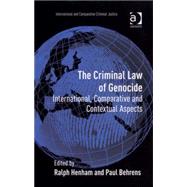The Criminal Law of Genocide: International, Comparative and Contextual Aspects
, by Behrens,Paul; Henham,Ralph- ISBN: 9780754648987 | 0754648982
- Cover: Hardcover
- Copyright: 12/28/2007
Please Note that Author Paul Chalfont has changed his name to Paul Behrens since original ABI was sent on 2/19/07The Criminal Law of Genocide is a provocative examination of genocide as both a legal and a social concept. Deeply interdisciplinary in its focus, this edited volume presents bold arguments from fresh voices and from seasoned experts.Mark A. Drumbl, Professor of Law, Ethan Allen Faculty Fellow, and Director of the Transnational Law Institute, School of Law, Washington & Lee University USA.This volume presents a contextual view of genocide which allows a consideration of the social and political concepts of the crime and of its historical dimensions as well as its legal treatment. It also suggests alternative justice solutions to the phenomenon of genocide.This collection of essays presents a contextual view of genocide. The authors, who are academic authorities and practitioners in the field, explore the legal treatment, but also the social and political concepts and historical dimensions of the crime. They also suggest alternative justice solutions to the phenomenon of genocide. The book is divided into five parts. The first offers an historical perspective of the crime. The second consists of case studies examining recent atrocities. The third section examines differences between legal and social concepts of genocide. Part four discusses the treatment of genocide in courts and tribunals throughout the world. The final section covers alternatives to trial justice and questions of prevention and sentencing.Contents: Preface, Ralph Henham and Paul Chalfont. Part I Historical Perspectives: The Armenian Genocide. A contextual view of the crime and politics of denial, Raffi Sarkissan; Armenian genocide claims: a full version of the 1915 events, Sadi Cayci; Genocide and Nuremberg, Henry T. King. Part II Case Studies: Has genocide been committed in Darfur? The state plan or policy element in the crime of genocide, William Schabas; Sudan, the United States and the International Criminal Court: a tense triumvirate in transitional justice for Darfur, Zachary Kaufman; The major powers and the genocide in Rwanda, Roméo Dallaire and Kishan Manocha. Part III Aspects of the Crime: The schism between the legal and the social concept of genocide in light of the responsibility to protect, Larissa van den Herik; Is the emerging jurisprudence on complicity in genocide before the international ad hoc tribunals a moving target in conflict with the principle of legality?, Michael G. Karnavas; Telling stories and hearing truths: providing an effective remedy to genocidal sexual violence against women, Fiona de Londras; A moment of kindness? Aspects of genocidal intent, Paul Chalfont; Freedom of speech vs. hate speech. The jurisdiction of ''direct and public incitement to commit genocide, Tonja Salomon. Part IV International and Domestic Prosecution of Genocide: The prohibition of genocide under the legal instruments of the International Criminal Court, Tuiloma Neroni Slade; ICC investigations and a hierarchy of referrals: has genocide in Darfur been predetermined?, Chris Gallavin; Specificity of indictments in ICTR genocide trials, Paul Ng''arua; Cambodia''s extraordinary chamber: is it the most effective and appropriate means of addressing the crimes of the Khmer Rouge?, Alex Bates; The prosecution of genocide - in search of a European perspective, Jan Wouters and Sven Verhoeven; Reflection on the separation of powers: the law of genocide and the symptomatic French paradox, Caroline Fournet. Part V Prevention, Alternative Justice Solutions and Sentencing: The United Nations and the prevention of genocide, Juan Mendez; Criminal justice in the aftermath of the 1994 Rwanda Genocide, Shivon Byamukama and John Huntley; The normative context of sentencing for genocide, Ralph Henham; Genocide, reconciliation and sentencing in the jurisprudence of the ICTY, Sharhram Dana; Index.About the AuthorRalph Henham is Professor of Criminal Justice at Nottin







